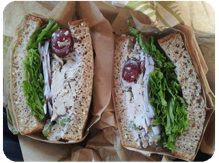 California’s Silicon Valley is known the world over as a hub of technological innovation. Along with established giants like Google and Facebook, the Bay Area suburb is home to countless startups hoping to launch the next big social network or app. But not every entrepreneur in the Valley is a code-focused Mark Zuckerburg-type. In one burgeoning industry, scientists at several startups are cooking up revolutionary ways to use plants as meat substitutes in food.
California’s Silicon Valley is known the world over as a hub of technological innovation. Along with established giants like Google and Facebook, the Bay Area suburb is home to countless startups hoping to launch the next big social network or app. But not every entrepreneur in the Valley is a code-focused Mark Zuckerburg-type. In one burgeoning industry, scientists at several startups are cooking up revolutionary ways to use plants as meat substitutes in food.
These aren’t like the bean burgers or “tofurkey” you’ll find in many supermarkets, however. Rather, these companies are developing plant-based imitations that are indistinguishable from the real meaty thing. For instance, one startup called Impossible Foods uses plant materials to recreate every component of a piece of beef, from the meat’s muscle and connective tissue to the fat. The company has already used this process to develop a hamburger that looks and cooks just like a genuine patty. Another company, Beyond Meat, makes an authentic-tasting veggie chicken strip that has been on the market since 2012.
Despite the meatless appeal of these products, vegetarians and vegans are not the target demographic. Impossible Foods and Beyond Meat are more focused on winning over carnivores to their cause, and not just because they represent a wider customer base. Like other idealistic Silicon Valley ventures, these startups want to change the world for the better with their business. After all, making meat takes up an immense amount of resources, with just one kilogram of beef requiring more than 10 kilograms of feed to produce. What’s more, the United Nations estimates that livestock occupies approximately 30 percent of the world’s land and contributes 14.5 percent of all greenhouse gas emissions. These numbers will only get worse as the need to produce more food grows with the globe’s population, which is expected to balloon to more than 9 billion people by 2050. But while the need for meatless alternatives to popular foods is apparent, marketing steaks and ribs that didn’t come from cows or pigs to Americans will certainly be a tall order.
Questions:
- What’s the most crucial challenge meat substitutes face?
- As world population swells, will non-traditional food alternatives grow?
Source: “Silicon Valley Gets a Taste for Food,” The Economist, March 7, 2015. Photo by: Jon Fisher.
